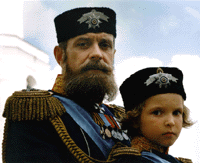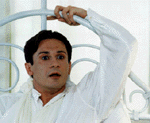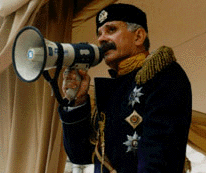
| In This Issue |
 |
| Renting an Apartment |
| Crime & Punishment in Las Vegas |
| Sports Clichés | Negro Comix |
 |
 |

I've always consciously avoided new Russian films here in the Kino Korner without really explaining why. Perhaps now I should--explain why, that is.
For one thing, they tend to disappear from the cinemas too quickly. But more importantly, my knowledge of Russo-Soviet film history is regrettably lacking in the breadth that only an upbringing of repeated late-night-cable-TV viewings can provide. And without such a thorough grounding in the fundamentals, I hardly feel qualified to subject contemporary Russian cinema to the kind of blathering quasi-analysis that has led certain self-important U.S.-based new media drones to brand me "a jerk of the first order" and "the world's most obscure and irrelevant film critic."
The Barber of Siberia, director Nikita Mikhalkov's long-awaited (or
 |
But like most previous Western-inspired experiments during Russia's "reform" era, the movie's version of Hollywood is largely a second-rate embarrassment. Even without the plodding 3-hour runtime, it would be hard to see Barber as anything but an attempt to create a Russian Titanic. The epic tale of thwarted lovers, half-baked flashback structure, ill-fated manmade folly, simplistic class commentary, senseless glorification of historically dubious "folk" traditions--it's all there. The difference is that, with a budget only a quarter the size of Titanic's, there's nothing in the way of a cutting-edge special-effect-fueled calamity at the end to make the tedious prelude seem at all worthwhile. To be honest, though, I was more bewildered by the fact that Mikhalkov somehow managed to fill 180 consecutive minutes of film with even less meat and emotional depth than was contained in James Cameron's record-setting behemoth.
Oleg Menshikov is dishearteningly ineffectual in the lead role. He grins like a moron and looks ridiculous firing a rifle; an extremely nearsighted viewer might even mistake him for Mark Harmon--another actor whose career went into a serious quality nosedive after he was named his country's "Most Handsome
 |
| "Like the eXile, I used to be good!" |
I could be accused of holding a grudge because I wasn't one of the "limited number of journalists personally authorized by Mikhalkov to receive invitations to the premiere" (actually, the director's press rep was smart to refuse my request for accreditation--I would have handed the tickets over to Edward Limonov and his National Bolshevik Party soldiers, who had hoped to somehow crash the party). Maybe so. Anyway, let's forgo the aesthetic nitpicking and examine some of the more sinister aspects of the film's background.
The government financing is a good place to start. Russia-watchers might be tempted to ask a country that is unable to pay salaries or pensions to its soldiers, teachers, doctors, and elderly, let alone provide funding to its cash-strapped film industry, can give $10 million to the only domestic filmmaker not in need of financial assistance. Mikhalkov did manage to round up an additional $35 million from foreign sources, after all. Under the circumstances, it is difficult not to interpret the "gift" against the general backdrop of state corruption that has plagued Russia.
For starters, consider the director's decision to hold the film's world premiere in Kazakhstan as part of a celebration of the blatantly rigged reelection of President Nursultan Nazarbayev.
Then there was Mikhalkov's highly visible campaign as the #2 man on Prime Minister Viktor Chernomyrdin's "Our Home is Russia" ticket in the 1995 parliamentary elections. After the elections, both handed over their seats and moved on to bigger things: Chernomyrdin kept his comfy chair in the White House, while Mikhalkov returned to the film business with $10 million of government money in his pocket. Now longtime Chernomyrdin-backer Boris Berezovsky has begun hinting that he might support Mikhalkov if he were to run for president next year.
What if the $10 million grant were not a grant at all, but rather campaign financing in disguise? I for one can think of worse election advertisements. Actually, most of the Western press has published articles contemplating precisely such a hypothesis, although usually only in half seriousness. Many have even braved the perilous logical leap of interpreting the director's brief cameo appearance as the universally respected Tsar Aleksandr III as Mikhalkov
 |
| "Listen to me, you peasants!" |
Whatever his real chances at winning, it seems clear to me that Mikhalkov's imperial-presidential posing is about more than just hyping the film. Consider the historical model he uses for his leadership dress rehearsal. Aleksandr III's reign was marked by a relative calm that the country has rarely known, making him sort of the Brezhnev of Tsarist Russia--beloved for blandness. Amid all this indistinct remembering of unmemorable, but supposedly benevolent dictators, Mikhalkov allows one image to come through crystal clear: his own unmistakable countenance inside the Kremlin before the admiring gazes of Russian soldiers and beneath not the red and black flag of the Romanovs but rather the modern-day tricolor, which traces its origin back to the Civil War that followed the October Revolution. In other words, Mikhalkov as constitutional-monarchist president of Russia in the very near future, when he will reveal what he knows to be the National Idea, vanquish the oligarchs and corrupt bureaucracy, providing the impetus the country needs to fulfill its unique destiny and all those other bedtime stories.
If, according to the comparison currently popular, Berezovsky is today's Rasputin, that makes Nikita Tsar Nicholas, as in the second. And everyone remembers what happened to him.
All of which may be a ridiculously convoluted conspiracy theory, but it does at least help to explain why The Barber of Siberia is such a bad movie. It also explains why in the Russian release, the English dialogue (70% of the whole, an amount supposedly selected to make Barber eligible for non-foreign Oscar honors--frankly, Mikhalkov has a better chance of being elected president of Russia), whether spoken by man, woman, or child, is all dubbed by the director in his most pathos-filled voice. When a $45 million schmaltz epic with self-proclaimed Oscar hopes decides to forgo not only the preferred subtitles, but also a professional dubbing job that preserves the original sound effects or even having different voices to distinguish the male and female characters, it's a pretty good sign of either an inferior artist at work (which Mikhalkov is not) or a film whose purposes have nothing to do with art whatsoever.
It is comforting that most Russian viewers seem to recognize the film's lack of substance. If the showing I was at is any indication, Russians want very much to like this film. But Mikhalkov has given an extremely forgiving audience almost nothing to work with. As such, there was occasional laughter at some of the clumsier slapstick and reserved, sporadic applause as the closing credits began to roll--but the feeling of national pride most seemed to have come for was not to be. Instead, The Barber of Siberia is just another state-funded project that promises big payoffs, but with someone absconding off to Western Europe with the loot as always.
Perhaps no one put it more aptly and succinctly than Yelena Dyakova in this week's Novaya Gazeta, when she asked "for what and for whose benefit was this done?" This is a question whose answer is equally perplexing and disturbing no matter whether you're talking about The Barber of Siberia or the mess of Yeltsin-era budget spending as a whole.


